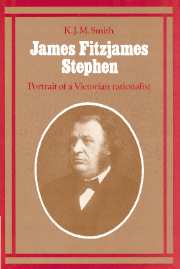Book contents
- Frontmatter
- Contents
- Preface
- 1 EARLY IMPRESSIONS: SIR JAMES, ETON AND CAMBRIDGE
- 2 A CONTROVERSIALIST IN THE MAKING: LITERARY CRITICISM AND LEADER-WRITING
- 3 A SCIENCE OF CRIMINAL LAW
- 4 ‘LAW LIVING AND ARMED’ – THE MECHANISM OF ENFORCEMENT
- 5 THE THREAT OF ‘HOOFS AND HOBNAILS’
- 6 INDIA AND THE IMPERIAL ETHIC
- 7 LIBERTY, EQUALITY, FRATERNITY: REFUTATION AND APOLOGIA
- 8 RATIONALISM'S BURDEN
- 9 THE BENCH AND BEYOND
- Notes
- Bibliography
- Index
8 - RATIONALISM'S BURDEN
Published online by Cambridge University Press: 30 September 2009
- Frontmatter
- Contents
- Preface
- 1 EARLY IMPRESSIONS: SIR JAMES, ETON AND CAMBRIDGE
- 2 A CONTROVERSIALIST IN THE MAKING: LITERARY CRITICISM AND LEADER-WRITING
- 3 A SCIENCE OF CRIMINAL LAW
- 4 ‘LAW LIVING AND ARMED’ – THE MECHANISM OF ENFORCEMENT
- 5 THE THREAT OF ‘HOOFS AND HOBNAILS’
- 6 INDIA AND THE IMPERIAL ETHIC
- 7 LIBERTY, EQUALITY, FRATERNITY: REFUTATION AND APOLOGIA
- 8 RATIONALISM'S BURDEN
- 9 THE BENCH AND BEYOND
- Notes
- Bibliography
- Index
Summary
SCEPTICISM IN THE MAKING – TESTING THE EVIDENCE
Not long after completing Liberty, Equality, Fraternity, Stephen prepared a ‘statement of my religious opinions’ for his children, partly to explain his ‘unnatural degree of reserve to you all on these matters’, and also to deal with their ‘surprise at my taking no part either in family prayers, or in the services at church on Sundays’. This concern to ensure his children approached religious understanding with a semblance of open-mindedness reveals something of Stephen's own progression from initial acceptance of the primary tenets of Anglicanism to eventual unbelief. It was a journey not altogether willingly undertaken, but one which a fiercely rationalistic cast of mind made largely inevitable. And, like the progression of his political and social philosophy, it mirrored to flattering advantage and disadvantage the character and obsessions of both Stephen and his era.
In the company of a good many of his peers, Stephen applauded the run of liberalising measures leading towards institutional secularisation whilst at the same time anxiously looking to the likely consequences for a society where religious beliefs appeared to be fast sliding away. An eighteenth-century rationalism, reinvigorated by a sympathetic climate of political advance and scholastic and scientific enlightenment, pressed hard for an adjustment or scaling down of spiritual sympathies in favour of purer intellectual demands. At least by the 1850, for the educated believer religious scepticism was something to be confronted and, where temperament allowed, passed through like any other unholy spectre.
- Type
- Chapter
- Information
- James Fitzjames StephenPortrait of a Victorian Rationalist, pp. 215 - 244Publisher: Cambridge University PressPrint publication year: 1988

